Totalitarian Legacy in the Refugee Crisis
Adelina Marini, September 3, 2015
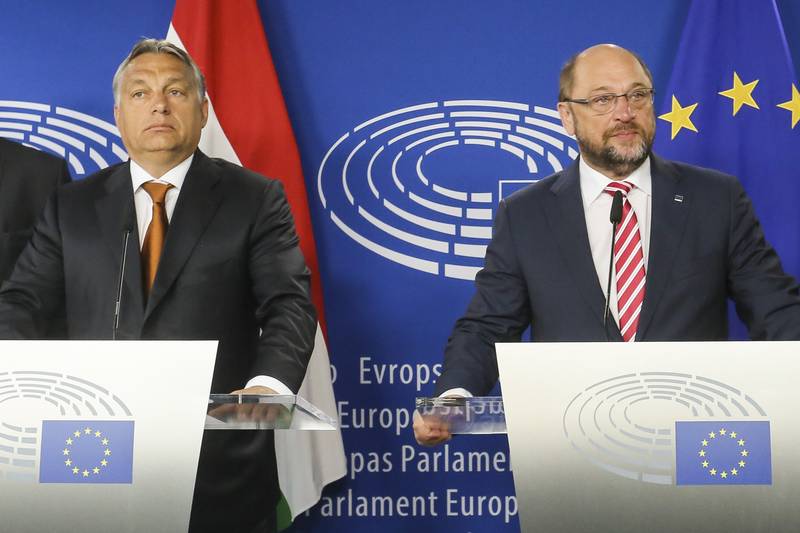 President of the European Council Donald Tusk – Polish activist from the pro-democratic movement “Solidarity” – noted recently that division in Europe in attitude towards the refugees is along the East-West axis. This geographic division is only at the surface. A deeper look reveals that the division is between countries that were under the former USSR sphere of influence and the ones that weren’t. All former communist bloc countries, with no exception, are hostile towards the people running away from the horrors of war in the Middle East and Afghanistan. Those are the countries that either refuse to accept refugees, treat them badly, or select on the basis of religion. Those are the states that breed and feed fears of Islamisation, where conspiracy theories of premeditated organisation of the refugee flow aiming to destroy Europe flourish, states where humanity towards the fleeing is rare. Ironically enough, those are the same states, which were the largest source of migrants and refugees into Western Europe before and after the fall of the Berlin Wall.
President of the European Council Donald Tusk – Polish activist from the pro-democratic movement “Solidarity” – noted recently that division in Europe in attitude towards the refugees is along the East-West axis. This geographic division is only at the surface. A deeper look reveals that the division is between countries that were under the former USSR sphere of influence and the ones that weren’t. All former communist bloc countries, with no exception, are hostile towards the people running away from the horrors of war in the Middle East and Afghanistan. Those are the countries that either refuse to accept refugees, treat them badly, or select on the basis of religion. Those are the states that breed and feed fears of Islamisation, where conspiracy theories of premeditated organisation of the refugee flow aiming to destroy Europe flourish, states where humanity towards the fleeing is rare. Ironically enough, those are the same states, which were the largest source of migrants and refugees into Western Europe before and after the fall of the Berlin Wall.
Where does this paradox come from?
First of all, we are talking about countries that lived for decades under socialist dictatorships, completely isolated from the rest of the world. In all of them any contact with Western culture, media, and people was strictly banned and persecuted. Those are people that were forced into conformity in dressing, thinking, and acting, who to this day are unable to accept the different ones and dissidents. 25 years passed since the fall of the Berlin Wall. 10 years from the major enlargement of the EU towards the former socialist dictatorships. In this time some walked the road to the end of the transformation from Rule of the Party to Rule of Law successfully. Others did not finish the process. It is exactly in this transformation that hides the key to the explanation why the states that did not finish the process successfully are the ones most hostile to refugees. In some of them xenophobia, hate speech, and neo-Nazi inclinations appeared long before the refugee crisis and remain uncondemned and unprosecuted.
The ultimate example is Hungary, which has been criticised for years by EU institutions that it is returning to dictatorship after the suspension of media freedom and the independence of key state institutions, like the national bank and the courts. This is why, although scandalous, the words of Hungarian Prime Minister Viktor Orbán that essentially the refugee crisis is not an European problem, but only a German problem, for everyone wants to go to Germany, are not surprising. He said this after a meeting with European Parliament President Martin Schulz in Brussels, where, in his words, he went to ask the European leaders to stop criticising his country for what it does. And what Hungary is doing, he believes, is correct. No hopes should be given to the people fleeing from the horrors of war, genocide, and culturecide of the terrorist organisation “Islamic State” that they are welcome in the EU, for this would encourage more, he said, answering a question why he speaks only of following regulations but utters no word about humanity.
Martin Schulz reminded him that he should well remember life under a dictatorship, although it is doubtful he does after announcing officially last year the failure of liberal democracy and a turn towards non-liberal democracies – or rather dictatorships – following the example of Turkey, Russia, and China. Slovakia, on the other hand, which divorced its communism late, has obviously not broken away from it entirely for it announced that it will only accept Christian refugees, for Muslims are not welcome. There were no mosques in the country and this was the reason they would not feel at home. Bulgaria, which is the brightest example in the EU for a failed transition towards a rule of law and is also governed by a leader with an inclination towards one-man rule, sent its army to the border with Macedonia to protect itself from refugee entrance.
The subject does not make the headlines in the country and the government is sending controversial messages. The main position of Sofia is that a distinction must be made between economic migrants and refugees. How this is to be done, though, Bulgaria does not say, nor does it do such distinction at its borders. Poland, whose millions of economic migrants to the richest EU countries spawned the dread of the Polish plumber, agrees to the quota allocation but declares that it would rather not accept Middle East refugees for it needs the space for refugees from the conflict in the Ukraine. The only exceptions from this group are the EU member states from former Yugoslavia – Croatia and Slovenia.
Afraid they will fail
Another consequence of totalitarianism, which created a culture of intolerance to the alien is the uncertainty of/in the rule of law. If it is stable and it is clear that any crime will be prosecuted and punished, there should be no fears of growing crime rates because of the refugees, nor fears of Islamisation. If a society has sound traditions in equality and integration, then it should not fear assimilation. If the justice and law enforcement systems are working well, the state would fight successfully against organised crime that is flourishing at the moment with the refugee crisis.
It is exactly the uncertainty in the rule of law that is the reason behind the return of old totalitarian habits in some of those states. This same uncertainty is the reason why Bulgaria and Hungary keep referring meticulously to European rules and regulations and follow them to the T. Especially in Bulgaria’s case, this is a funny contradiction keeping in mind the country suffered a total fiasco in respecting the law with the constant changes in legislation in all spheres, done to accommodate whoever is in power and with all the successful attempts of people with sentences to evade justice.
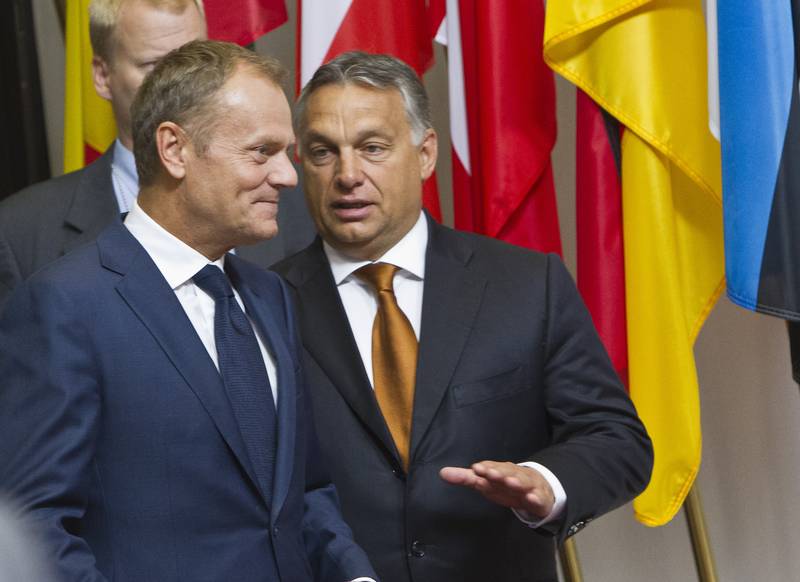 Last but not least reason for the different treatment of refugees is the unsanitary media environment, which is the main source of the anxiety that Viktor Orbán talked about in Brussels today. What is more, he presented himself, as a typical dictator, as a spokesman of the Europeans, “who are filled with fear”. While Western media, Croatian and Slovenian included, are full of compassion towards the refugees’ misfortune, the former socialist states’ news are instilling fear and horror of the incoming hordes of aliens.
Last but not least reason for the different treatment of refugees is the unsanitary media environment, which is the main source of the anxiety that Viktor Orbán talked about in Brussels today. What is more, he presented himself, as a typical dictator, as a spokesman of the Europeans, “who are filled with fear”. While Western media, Croatian and Slovenian included, are full of compassion towards the refugees’ misfortune, the former socialist states’ news are instilling fear and horror of the incoming hordes of aliens.
Certainly the split within the EU on the topic of refugees is not only along the East-West axis. It is way more complicated but the one between the former communist states and the rest is one of the largest challenges to the Union for it floated to the surface as a very serious problem in this crisis, but it could be also felt in the EU’s foreign policy, especially towards Russia. As euinside wrote, the Berlin Wall is still here, it is deeply rooted on a mentality level. Martin Schulz is right in saying the biggest threat to the EU are not refugees but national egoisms. It is completely unacceptable to stand up in the heart of Europe and say the refugees are not a European problem but only a German one when the problem with refugees is not new at all neither to Greece, nor Italy or Malta. It is new to the Eastern states after the Western Balkans route has turned into one of the major arteries into the EU.
What would have happened if the Western states had not opened their markets for workers from the new countries with the argument that their unemployment and bad management are not a European problem but their own, of the former socialist states? We all have our problems in the EU – each state their own. Some are poorer, others less developed, third are full to the brim with all types of migrants and all manner of crises, but you cannot, at the background of the little child’s body, washed up on the beach, think that only after we are done solving all of our own problems, only then can we stop and think about those, who are fleeing the horrors of war. The former socialist states, however, suffer from an inferiority complex, having endured and made themselves so many mistakes in the close and distant past, so now they are terrified that they could make the wrong decision again. Thus looking for salvation in the letter of European law, for they do not yet trust their own.
Translated by Stanimir Stoev
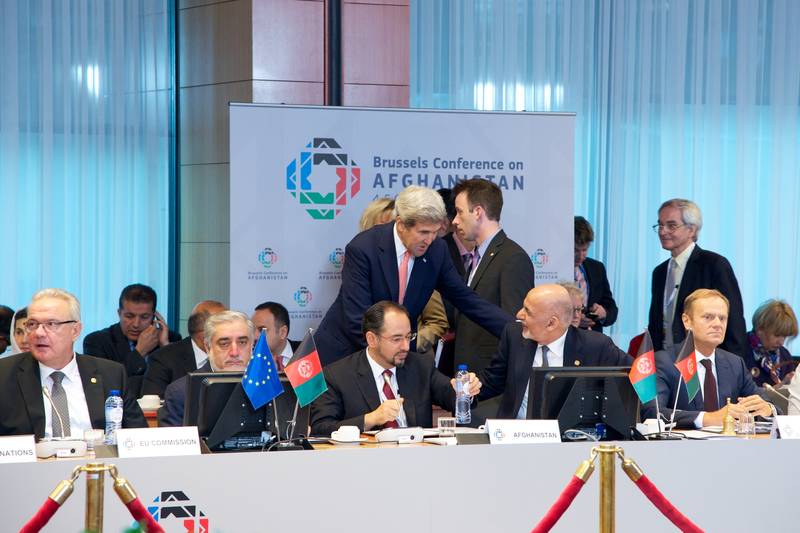 | © Council of the EU
| © Council of the EU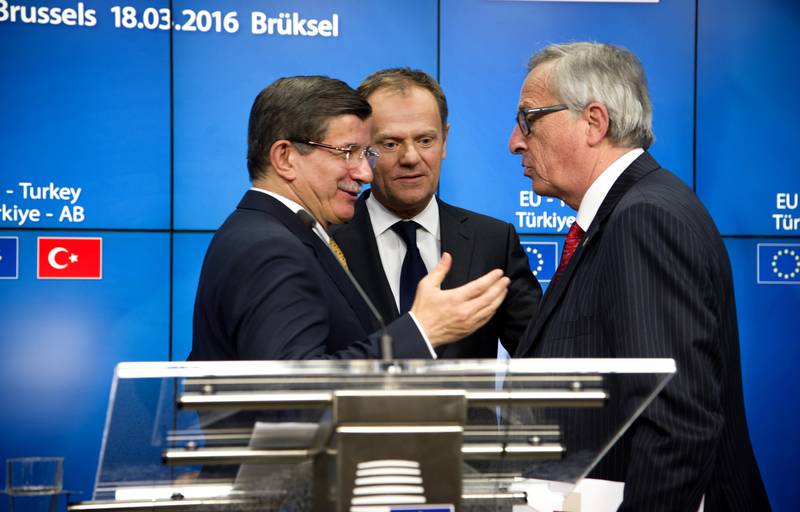 Davutoglu, Tusk, Juncker | © Council of the EU
Davutoglu, Tusk, Juncker | © Council of the EU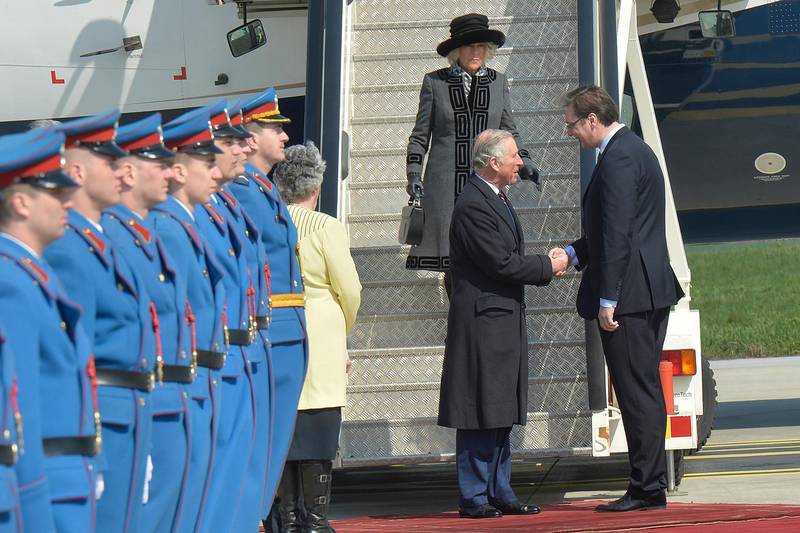 | © Vlada RS
| © Vlada RS